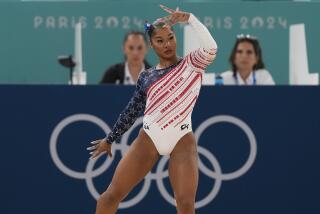IOC pushes U.S. to act fast
- Share via
In an apparent attempt to hasten the resolution it favors, the International Olympic Committee has established a relatively tight deadline for the next step involving removal of medals for the 2000 Olympic relays that included confessed doper Marion Jones.
Within hours of saying the fate of the other eight runners’ medals would depend on action by the U.S. Olympic Committee, the IOC pushed the USOC to deal with the case quickly.
In a letter dated Dec. 12, a copy of which was obtained by the Chicago Tribune, the IOC disciplinary commission said the USOC had until Jan. 31 “in order to submit a defense in writing.”
When the USOC had a conference call with the athletes last week to tell them of the letter and the deadline, Washington attorney Mark Levinstein was representing seven: Torri Edwards, Chryste Gaines and Passion Richardson (prelims) from the bronze-medal 400-meter team; Jearl Miles-Clark, Monique Hennagan, LaTasha Colander-Richardson and Andrea Anderson (prelims) from the gold-medal 1,600-meter team.
The eighth, Nanceen Perry, was not on the conference call.
Levinstein had successfully argued to the Court of Arbitration for Sport on behalf of the gold-medal U.S. men’s 1,600-meter relay at the 2000 Olympics that included one member, Jerome Young, who should have been ineligible because of a doping offense. CAS said rules in place at the time did not allow for taking medals from the rest of the runners.
Both the USOC and IOC believe the CAS precedent should not apply to the current case.
The USOC supported and paid nearly $200,000 in legal fees for the men’s relay, which included track superstar Michael Johnson.
This time, it seems disinclined to submit any defense, given that USOC Chairman Peter Ueberroth has asked the women to return their medals voluntarily. IOC President Jacques Rogge supports Ueberroth’s position.
“We are not trying to deny the athletes their rights,” USOC spokesman Darryl Seibel said. “There is, however, no getting around the fact a teammate who ran in the final of both relays recently has admitted to cheating.
“We understand some of the relay athletes may be frustrated by this situation. But that frustration should be directed toward their teammate who made the decision to cheat.”
In announcing the Dec. 12 decision to strip Jones of her five 2000 Olympic medals, Rogge said the IOC had begun the process to remove her relay teammates’ medals but conceded they had the right to a hearing.
“You cannot jump a legal procedure, even if they are evident, even if they are maybe formal in some way,” Rogge said. “We have to respect natural justice.”
Rogge said that because the relay was a team event, the USOC had to represent its athletes.
While IOC officials told the media the USOC could forward statements and evidence from the relay members as to why they should keep the medals, the IOC’s instructions in the Dec. 12 letter make no mention of such a process.
USOC officials also are perplexed by the notion of having to defend the athletes before the IOC has decided to remove their medals. In the Young case, the USOC appealed after the IOC backed a decision by the international track federation council to strip the medals.
Levinstein, who has written to the USOC board of directors on behalf of the women runners, declined to comment.
--
Philip Hersh covers Olympic sports for The Times and the Chicago Tribune.
More to Read
Go beyond the scoreboard
Get the latest on L.A.'s teams in the daily Sports Report newsletter.
You may occasionally receive promotional content from the Los Angeles Times.






